
New Year’s Resolutions & ADHD: Try a New Year’s Theme Instead
It’s almost 2021… finally! While many people are creating a list of New Year’s resolutions, why not try something different this year? Only 8% of people make it through the whole year with their resolution, and a whopping 80% fail by February.
Keeping elaborate or challenging New Year’s Resolutions can be even harder with ADHD symptoms getting in the way. There’s good news though: instead of setting a massive challenge for yourself, try a New Year’s theme instead.
The Problem with Resolutions
As evidenced by the 80% failure rate, New Year’s resolutions seldom work, whether ADHD is in the picture or not. When “larger than life” goals are set, it’s easy to get swept up in the novelty of it during the moment, but too big resolutions can become too much to keep. Larger-than-life resolutions can be tricky to keep if they get boring, if your schedule changes interrupt the routine, or forgetfulness and inattention creep back in.
Try a New Year’s Theme Instead
While New Year’s resolutions come with the notion that there’s a rubric to measure yourself by, and if you don’t check the box, you fail. For example, if you set the lofty goal to run a marathon in 2021 and run 30 miles each week, you might feel hard on yourself if you don’t reach your goal.
So what is a theme? A theme is like a mantra for the year. Instead of setting rubrics and checklists, a mantra guides you throughout the year. Using a mantra for 2021 eliminates the daily pressure of measuring up to your checklist, and instead creates a more holistic view on self-awareness.
Choosing Your New Year’s Theme

Your mantra for the New Year can be a word, a phrase, or a simple statement like “I want to be more _____________ this year.” By reflecting on your theme, it can influence your day-to-day decisions. Each day-to-day decision you make can help propel you closer and closer to your goal.
To use the running example, your theme could be “I want to be more active this year.” While this doesn’t put so much pressure on your daily life, you can see how this could influence your choices. You might decide to run more often or join a running club, but you won’t feel like a failure if you don’t make X number of miles each week.
Here is another example: let’s imagine that your theme for 2021 is “I want to spend more time with my family.” You can then make decisions based on this theme. You might ask yourself:
- What can I do each day to make more time for my partner or children? (Maybe you build a new evening routine or maybe you wake up 30 minutes earlier.)
A theme isn’t about setting one goal. It’s about adding more to your life. You can still set mini-goals throughout the year to help you continue the theme.
How to Choose a Theme for the New Year
Are you ready to choose a theme for 2021?

Choose a theme, and then come up with a plan to put in place.
— Pam Valdes
Here are a few ideas to get you started:
- A Year of Gratitude: Focus on adopting an attitude of gratitude throughout the year.
- A Year of Self-Care: Focus on staying active, eating healthy, and getting enough sleep. Self-care is a large umbrella, and choosing this theme enables you to create healthy habits that benefit you and in the long-run (rather than setting one specific exercise or weight loss goal). You can start with this free course on self-care: A Happier You Starts with Self-Care
- I Can Tame Stress: Learn to incorporate stress management techniques throughout your day. Support your mental well-being through healthy outlets for stress.
- Time with Family: If your theme is time, you can work on ways to prioritize time with loves ones, build stronger relationships, and strengthening time management skills.
- “I Give Myself Permission to Be Okay Where I Am. I Am Doing My Best.” Learning to be in the moment isn’t always easy, but with this mantra, you can learn to focus on progress over perfection.
- A Year of Organization. Being organized more than just a clutter-free desk; it’s about the mindset and systems that you organize your thoughts.
These are just ideas. Remember, a mantra can be a single word or a phrase or an idea. Your theme can grow and develop over the year.
Putting Your Plan into Action
Once you’ve chosen your mantra for the year, create a plan to put it in place. Coaching may be a particularly beneficial way to help you do this.
If ADHD, or any of its co-occurring conditions, interferes with your plans for the year, know that working with a professional and finding a multidisciplinary treatment plan that works for you is an important step in managing symptoms and living the life you want.
Need More Guidance?
Whether you need help managing ADHD or need guidance putting your New Year’s theme into practice, we can help. Here at Next Step 4 ADHD, we provide comprehensive, multimodal support, including:
- Medication management
- Therapy
- ADHD coaching
- Online courses, including our Planning & Organizing Group Coaching Program which focuses on nutrition
To make an appointment or to learn more, call us at 502-907-5908. You can also request an appointment here.
Learn More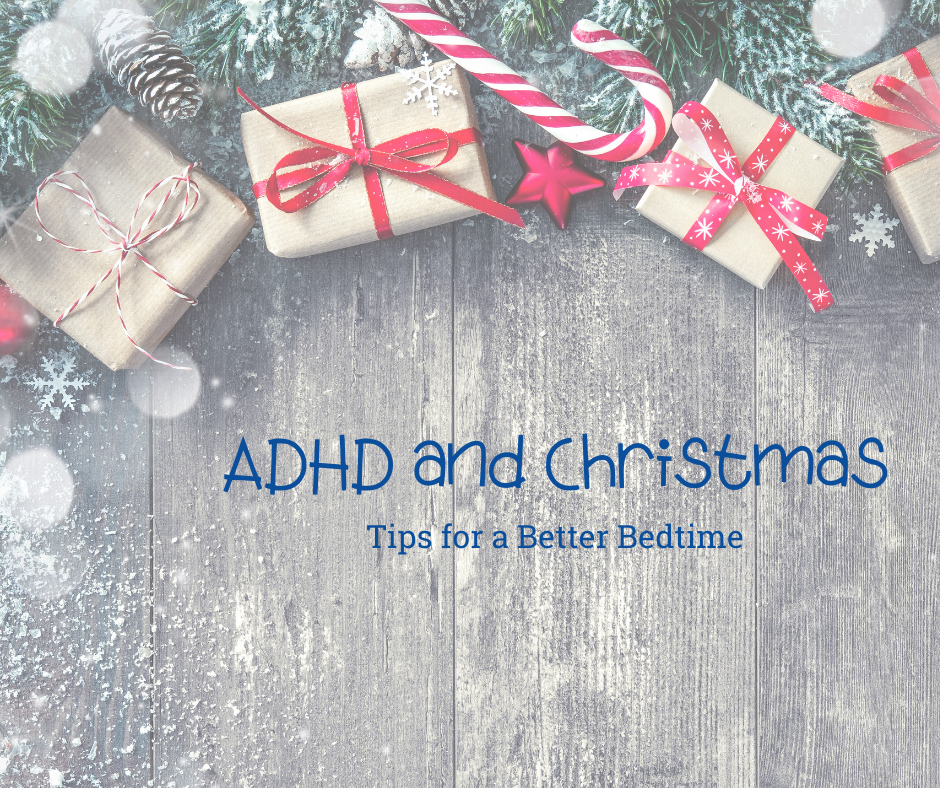
ADHD, Christmas, and Bedtime Routines! Oh My!
Bedtime battles are tricky enough for a child with ADHD, but the added excitement of Christmas can make bedtime even harder.
However, with a little preparation, you can create a peaceful — and Christmasy — bedtime routine for your child.
1. Exercise Is a Must
Exercise? As part of a bedtime routine? Believe it or not, exercise (or any physical activity) during the day helps you sleep better at night. According to Johns Hopkins Medicine, exercise during the day helps you fall asleep faster — and sleep better.
However, make sure your exercise isn’t right before bed as that can actually keep your child more awake. The goal is to get exercise logged in the morning or early afternoon.
Here are some holiday-inspired ways to stay active during the day:
- Go for a walk outside and see if your child can spot any signs of reindeer or elves
- Head to an ice skating rink
- Go skiing or cross-country skiing
- Build a snowman (if you have snow where you live)
You can even have a dance party in your home. Blast the Christmas carol remixed and dance, dance, dance!
2. Stick with Your Normal Bedtime
Children with ADHD thrive with structure and routine, and bedtime is no exception. If your child’s bedtime is usually 8 p.m., then keep that bedtime on Christmas Eve too.
However, you can add a festive touch to his or her normal routine.
- Adding a holiday-scented bubble bath to his or her bath
- Playing classical Christmas tunes during the wind-down period
- Singing Christmas carols instead of lullabies
3. Reading Christmas Books at Bedtime

Is reading to your child part of his or her bedtime routine? Reading to your child improves their language skills, teaches empathy, improves their vocabulary, but — most importantly — it’s a cozy time to bond with your child.
On Christmas Eve, read holiday-themed books to your child to help him unwind and soak up the lessons and stories about Christmas? Whether you read The Nutcracker, The Night Before Christmas, or The Polar Express, reading Christmas stories is sure to be a favorite holiday tradition.
4. Skip the Cookies, But Keep the Milk
Does your child leave out a plate of delicious Christmas cookies for Santa? While Santa might love the cookies, a sugary cookie isn’t the ideal bedtime snack for a child. You don’t have to skip the milk though. In fact, a warm glass of milk might even help your child fall asleep!
According to research, milk promotes restful sleep because it’s rich in melatonin and tryptophan. These are two sleep-inducing amino acids. For a special Christmas treat, sprinkle a little bit of cinnamon on top of the milk. Just be sure to avoid cinnamon-sugar.
5. Avoid Blue Light
Blue lights — the kind of light that your phone, tablet, or TV emits — can interfere with sleep. That’s because blue lights stimulate your circadian rhythm and tell your body to wake up. Warm-colored lights, on the other hand, are ideal for creating a cozy, soothing atmosphere right before bed. You might even notice that your phone or tablet has a night mode, which changes your screen from blue light to a warm, orange color.
Avoid blue lights for 1-2 hours before bed. Cozy up around the fireplace and read some Christmas stories!
More Sleep Hygiene Tips
You can read more about sleep tips in these articles:
What is your favorite Christmas Eve bedtime tradition?
Learn More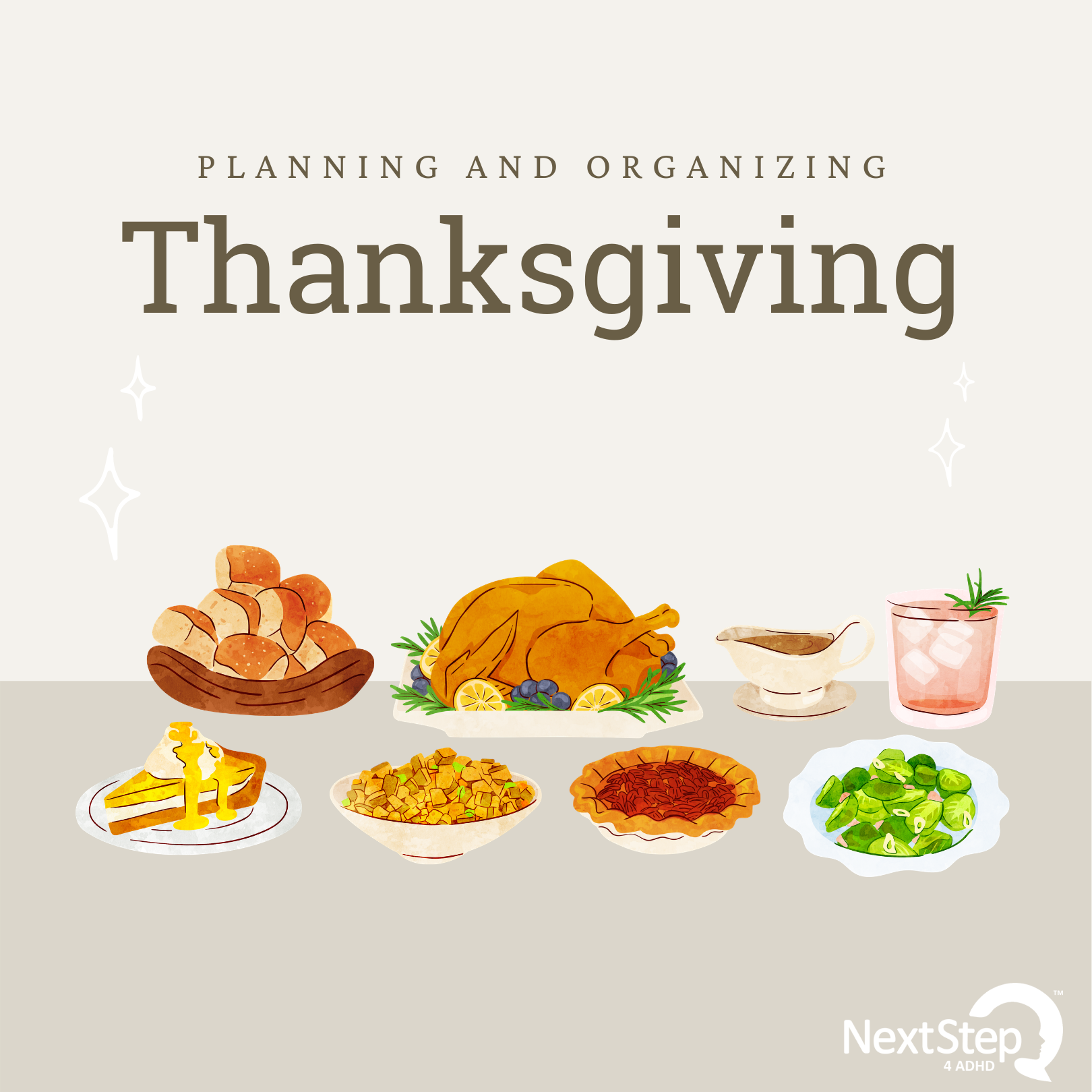
Planning Thanksgiving Dinner with ADHD? Tips for Success
Organizing and planning can be challenging tasks for adults with ADHD — and those are two skills necessary for planning a Thanksgiving dinner.
Thankfully, executive function skills — which include planning and organization — are teachable skills. And that means planning a successful Thanksgiving dinner is within your reach.
Here’s what you need to know:
Plan Your Menu in Advance
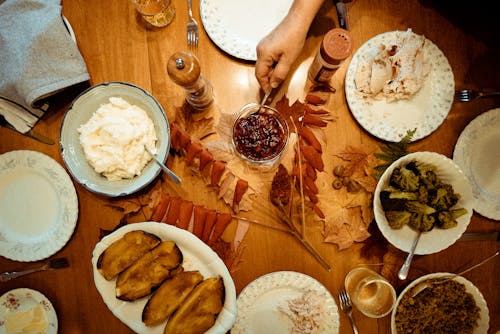
First things first: plan your menu!
Organizing your thoughts and goals for the day is important. You might benefit from using a journal to plan your menu. Be sure to plan for all components of your meal, including:
- The main dish (it’s okay if turkey isn’t your thing)
- Vegetables
- Starches, including mashed potatoes and sweet potatoes
- Side dishes, including cranberries or other sauces
- Appetizers
- Bread or rolls
- Desserts
- Beverages
Creating this master menu is step one in managing your time on Turkey Day. For example, you might choose to make some of these items the day before Thanksgiving Day. You might need to take out your turkey from the freezer. We’ll get to time management tips later in this article, but for now, know that your menu is the first step to a successful event.
Need inspiration? Here’s a list of 50 tasty Thanksgiving recipes.
Prepare for Your Grocery Trip
Planning for a big event like Thanksgiving can seem daunting especially when your ADHD symptoms ― poor time management, inattention, difficulty organizing —start infiltrating your grocery shopping trip. Another ADHD symptom ― impulsivity ― makes grocery trips particularly difficult.
The best way to combat these challenges is to prepare for your grocery trip. Trying to plan a meal for a large party is difficult without planning, whether you have ADHD or not.
Before you even head to the store, you’ll need:
- A grocery list (including any items you need for the party e.g., paper plates, candles, décor)
- A designated time to shop (trying to squeeze in a large shopping trip isn’t ideal… allot plenty of unrushed time to shop)
- A full belly (shopping on an empty stomach increases your risk of impulsive buys and deviations from your list)
Tips for Making Your Grocery List
- Always write your list down, either on paper or in a digital grocery app. This will help eliminate forgotten items.
- Include quantities of items e.g. two cans of pumpkin puree or one 32-ounce can
- Be specific e.g. bread flour versus cake flour
- List out ingredients for a recipe e.g., instead of writing “pumpkin pie stuff” write two cans of pumpkin puree, eggs, two boxes of pie crust mix, 1-ounce jar of pumpkin spice mix, 1 pint of heavy whipping cream… and so on
Use Your Calendar
There’s a lot going on in the days leading up to Thanksgiving, and a calendar can you keep track of everything you need to do.
If time management is especially difficult for you, a calendar is even more so important.
You might use your calendar to create a schedule for:
- Setting out the turkey — some turkeys need days to thaw. You can check here.
- Setting the table
- Preparing any side dishes prior to Thanksgiving
- When to start baking
- When to put beverages in the fridge
- When to start cleaning for guests (you might start your cleaning days before Turkey Day and focus more on baking closer to the big day)
A well-organized calendar can help prevent last minutes scrambling.
Delegate
Just because you’re hosting Thanksgiving, doesn’t mean you have to do it alone. Delegating tasks, even small ones, can help the day run smoother.
Ideas include:
- Giving small (but well-defined) tasks to your children
- Be specific: instead of asking for “help” ask for specific help e.g., “sweep the dining room” or “write names on the place settings”
- Ask for friends or family members to bring a side dish (but write this on your menu so you can keep track!)
Delegating doesn’t just mean friends or family helping you. You might delegate or receive help in other ways too. This might include hiring a cleaning service to clean your house the day before Thanksgiving, or you might order pies from a local bakery. Note that these all require pre-planning so if you think you’ll outsource help, start the preparations well in advance.
Don’t Overestimate the Power of Simple
If you feel overwhelmed, try to focus on simple things. If the thought of roasting a whole turkey overwhelms you, try a turkey breast instead. If the idea of juggling oven time between pies and rolls is too much, go for simple. Order rolls from a bakery to free up some space.
At the end of the day, Thanksgiving is about coming together as a family and celebrating love, joy, and things we are thankful for in life — and a simple meal can be part of that.
Tools to Help You Plan
Here are a few suggestions to make planning Thanksgiving even easier:
- Online or paper calendar
- Online or paper grocery list
- Online grocery delivery services (Some grocery stores offer delivery, but you can use other apps like Instacart too.)
- The number to the Turkey Hotline! If you have a cooking problem, the Butterball Turkey Hotline can help!
Enjoy the Day!
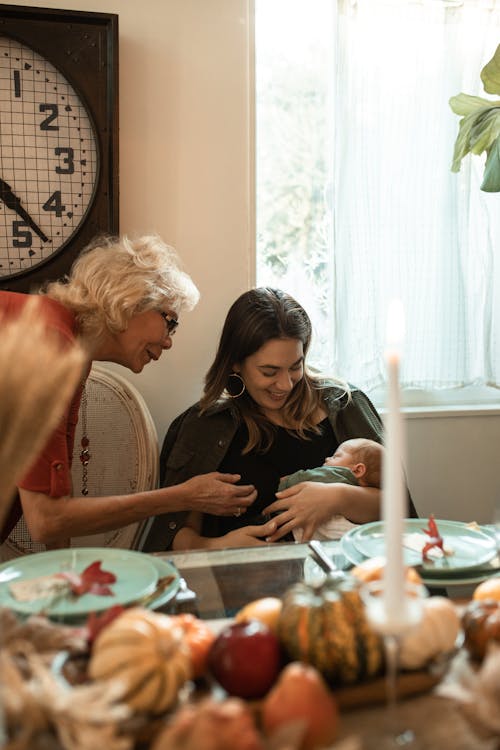
No matter how the day unfolds, remember to cherish the memories and celebrate those you love! If something goes wrong, or an ingredient goes missing, take a deep breath, center yourself, and carry on.
Need Extra Help with Planning and Organization?
If you’re still feeling overwhelmed with planning and organizing tasks, we can help. Here at Next Step 4 ADHD, we provide comprehensive, multimodal support, including:
- One-to-one ADHD coaching
- Medication management
- Therapy
- Online courses, including our FREE self-care course which focuses on nutrition
- Group courses, including Planning & Organizing Group Program
To make an appointment or to learn more, call us at 502-907-5908. You can also request an appointment here.
Learn More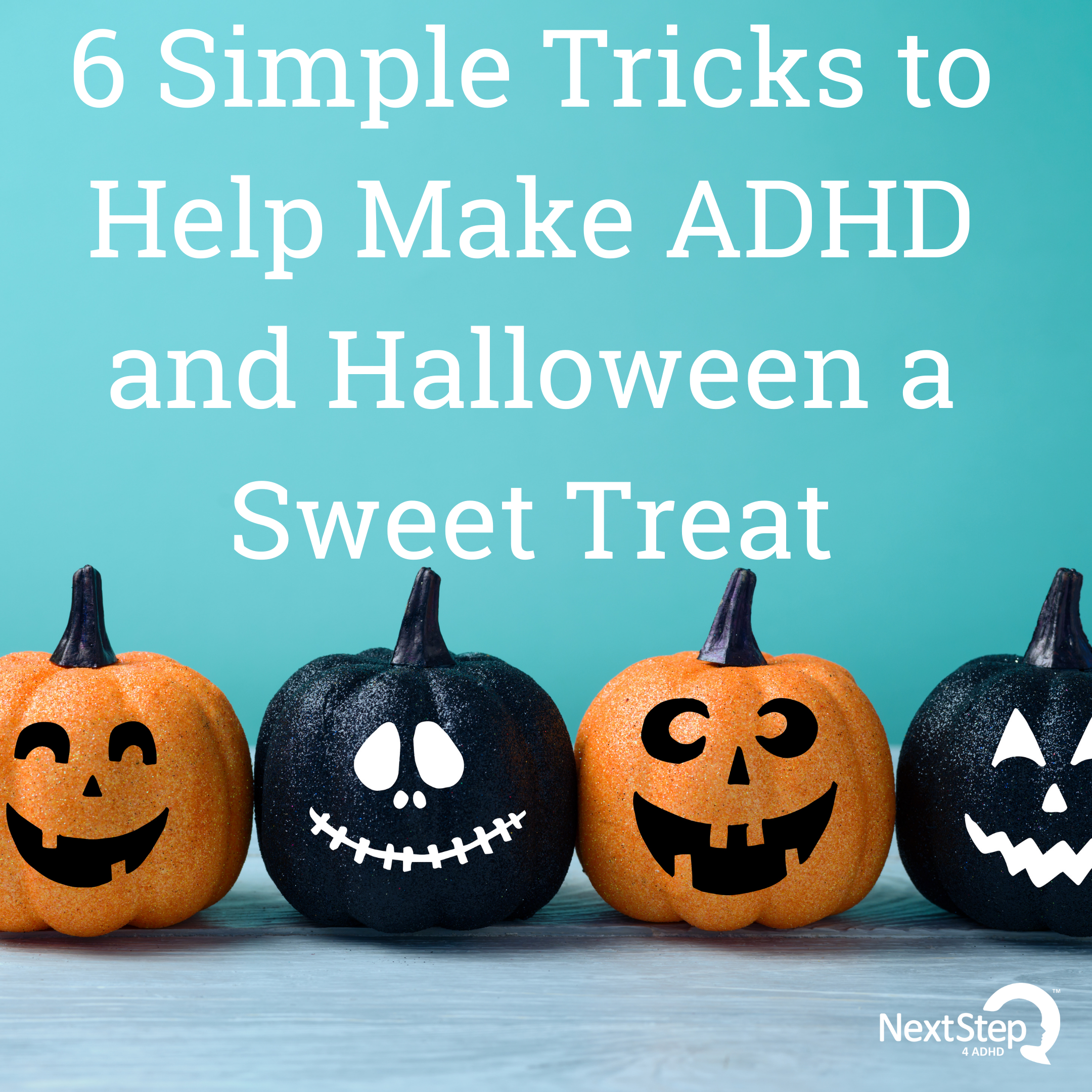
6 Tips to Make Halloween More ADHD-Friendly
Halloween is an exciting holiday for children. Even with changes to the 2020 Halloween guidelines, kids look forward to the festivities, the fun, and of course, the candy. Halloween is also full of distractions and routine disruptions, which can be challenging for kids who struggle with ADHD. With a little planning, though, you can make Halloween both safe and fun for your child.
Learn More